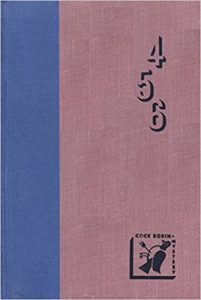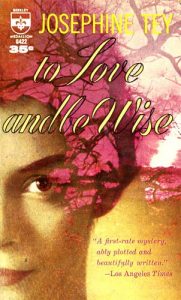…or rather, Tey for four. I’ve been on an author binge this summer, and I don’t regret a single minute of it.
After reading Nicola Upson’s marvellous mindbender An Expert in Murder, I went out collecting original Josephine Teys, to refresh my memory on her effortless, masterful style.
My first find was her 1950 novel, To Love and Be Wise.
Next I picked up the second volume of her collected mysteries, issued in the early 1950’s as Four, Five and Six by Tey. (Three by Tey being the straightforwardly-named first volume). This grouping includes the legendary The Daughter of Time, as well as The Singing Sands and Tey’s first book starring Inspector Alan Grant, A Shilling for Candles.
I phrased that description very carefully, and for good reason! You may recall that Tey’s real name was Elizabeth MacKintosh. MacKintosh wrote under various names: her own, the Tey persona, and “Gordon Daviot.” In an interesting twist on today’s obsession with personal branding, she introduced her detective Inspector Alan Grant in a novel credited to Daviot! Grant’s first appearance was in the 1929 novel, The Man in the Queue.
Reviews:
A Shilling for Candles sets off in tried-and-true whodunnit style, with the discovery of a body. The mysterious death of a glamorous actress sets the world press ablaze, and Inspector Grant of Scotland Yard is called in to help the local constabulary with a sensitive celebrity case. Red herrings and familiar character types abound, including curmudgeonly watchmen, garrulous housekeepers, a sympathetic prime suspect, shifty relatives, and a headstrong (dare I say “feisty?”) teenage girl.
However, it’s Tey’s style that elevates the book to a different level. Her narrative voice is so down-to-earth, so deceptively simple, that there is no question of the story becoming formulaic or trite. Tey stitches the story together with running threads of subtle humor. We are in on the joke, and can quietly enjoy the game with her.
We also get to know Inspector Alan Grant. Tey portrays her detective as flawed and human without turning him into an antihero. The Inspector is highly intelligent and talented at his job, but he’s neither a superman nor a saint. He is sincere, compassionate and thoughtful, but his flaws of perception, assumption and memory make him all the more believable.
The ending, though well-supported with means, motive and opportunity, was a slight let-down. The unraveling of the last red herring and revelation of the true killer felt a bit rushed in the wrap-up. But after all, if the worst you can say of a book is that there wasn’t quite enough of it? That’s no great criticism.
A solid four stars.
To Love and Be Wise begins with a party. Not just any party, but an overcrowded, overhyped book launch that no one seems to want to attend — except for a mysterious stranger. Leslie Searle, a meticulously polite American with otherworldly good looks, apologetically crashes the party looking for a friend of a friend. He makes Inspector Grant’s acquaintance by chance, and leaves him charmed but disconcerted in his wake.
On the very first page, Grant’s perception of the party reveals the other characters, but a great deal more about Grant himself. As in Shilling for Candles, Tey uses Grant’s singular perspective and his very human limitations to conceal and reveal important clues at just the right time. Overall, the wry tone and kaleidoscopic shifts of perspective will keep you happily guessing until the end.
Though contemporary readers may find the solution less surprising than Tey’s original audience, the story is filled with rich observation and a nice portrayal of the complexity of love and relationships. Tey is not afraid to leave some questions unanswered, and delivers an ending that completes the puzzle of the plot without pretending to solve the puzzle of human nature.
Four stars, plus.
The Daughter of Time was voted the greatest mystery novel of all time by the Crime W riters’ Association in 1990. To a mystery lover, it’s not hard to see why.
Grant is drawn to one face in particular: a face full of care, responsibility, authority, and suffering. It turns out to be Richard III, and Grant’s encounter with that intriguing face leads him to “reopen” the case against the reviled king. He recruits friends, friends of friends, his nurses and doctors, everyone who comes into his room, and investigates the accusation that Richard of York murdered his nephews, the princes in the Tower.
If you love mysteries and have never read this book…why? Fix this oversight immediately.
Five stars — with extra sparkle.
The Singing Sands was published in 1952. Sadly, it is the last of the Inspector Grant novels. Elizabeth MacKintosh died the same year, at the age of 56. Grant struggled with depression in Daughter of Time. The frame for this story is his struggle with crippling anxiety that manifests as claustrophobia. Overworked and shell-shocked from a long police career, Grant is sent away on a fishing holiday to rest and recuperate.
Tey takes us to some wonderful locations and lets us experience others through secondary characters — the Scottish countryside in the first green of spring, the windswept Hebrides, and the trackless dunes of the Sahara. She also treats us to her usual gentle humor in Grant’s precocious nephew, a pretentious neighbor, and Grant’s own sense of self-deprecating irony. A recurring theme among all these books is the close relation between the comical and the dangerous. On one hand, an unsettling situation may cause us to laugh with relief when we see it fully revealed. On the other, if we are too quick to label something “ridiculous,” we may overlook real hazards.
This novel would be worth reading just for the exploration of how a brilliant and self-aware person wrestles with mental health problems. Tey shows a fine balance between the practical effects of Grant’s physical health and the frustration of a constant inner battle. For Grant, it’s not just a fight between reason and irrational feelings — the fight itself is counterproductive. He knows it, and yet he can’t stop.
Squick Factor:
Unlike standard police procedurals, Inspector Grant (and Tey by extension) focuses almost entirely on understanding the character of the suspects. As I mentioned above, the plots of Singing Sands and Daughter of Time revolve around murders that happened long ago and far away, with which Grant has no direct involvement. And though Love and Be Wise and Shilling for Candles involve active investigations, I can’t recall a single graphic or gruesome moment in any of them. Tey was truly a master of crafting a compelling, suspenseful narrative without needing any “gotchas” of shock value. Squick factor: Nil.
Squick Factor Range:
0 – Nil.
1 – Meh.
2 – Kinda.
3 – Oh yah, you betcha.
4 – GAAAHHH! Nuke it from space!
Get More!
My newsletter subscribers get first look at all my reviews, along with exclusive recommendations for free and discount books! If you’re not already on the list, why on earth not? You can sign up by clicking right here:
[popup_trigger id= “free-download”]
SIGN UP on my VIP Readers List
[/popup_trigger]

